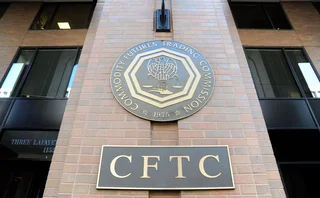The Blurred View of Risk

When I was at university, we used to have stock market nights at one of our campus bars on a regular basis. The premise was simple; a rudimentary index would be consistently running on screens above the pumps, listing the prices of various drinks. As demand increased for a particular drink, the price would go up, while the least popular ones, invariably the ales, would shrink in cost to sub-pound levels. What this meant, of course, was that you'd see rush squads of people clamouring to order the cheapest drink possible ─ we were students, after all ─ which would suddenly drive the price up. You might order a pint of Brains at 80 pence, but by the time it was put in front of you and the price rung up on the till, which was linked to the pseudo-exchange, it would be three quid.
Plus ça change, plus c'est la même chose, as our Gallic colleagues say.
Eventually, a group of us decided to get clever. We'd counter order for each other, purposefully front running the orders to maintain optimal price levels for the next wave of our group, who would benefit from the drop we precipitated. The cycle would reverse for the next round. Perhaps inevitably, we devised a rudimentary form of derivatives construction from this ─ the components in a snakebite are lager, cider, and blackcurrant, for instance, so affecting the individual prices of these underlying drinks, we learned, would have a direct ramification on the overall price of the component product, hedged by bolstering prices for other ones.
Needless to say, it became a mess rather quickly. Can you see where this is going? JP Morgan's announcement of its $2 billion trading loss (before offsetting income from asset sales), which seems to be down to disorganized or unlucky hedging using complex derivatives is something of a told tale. How such massive positions can be amassed and not alert internal surveillance and risk engines, particularly when it takes part in a risk-related area of the office, is unknown. But it does emphasize the need to have effective controls and proper oversight, technologically as well as in terms of human eyes, over all areas of an enterprise. For us, at the Aberystwyth student union, the only things that we lost were our dignity and the ability to eat anything other than cold beans for a week after. For large investment banks, as we've seen over the past few years, the stakes are much higher.
Extensions and Implementations
On the subject of derivatives, the US Commodity Futures Trading Commission (CFTC) announced yesterday that it would be extending its deadline for swap execution facility (SEF) regulation, under Article VII of the Dodd-Frank Act. Originally scheduled for July, there's not a great deal of surprise that this has been prolonged.
The CFTC also noted that it was nearing completion for what it will consider a swap dealer, and security-based swap dealer, two key components of the regulation. The effective date is now 31 December 2012. For more information on SEFs, see my colleague Timothy Murray's excellent and in-depth feature here.
Outside of regulation, derivatives and alcohol, it's also worth bringing to your attention that the Waters rankings are still open for voting. The period to submit your choices closes at midnight on 25 May, so please do get involved in what should be a great event.
If anyone would like to talk SEFs, JP Morgan, or the particular idiosyncrasies of Aberystwyth University ─ I know there are a few of you out there ─ please do feel free to give me a call on +44207 316 9811, or send an e-mail to james.rundle@incisivemedia.com.
Only users who have a paid subscription or are part of a corporate subscription are able to print or copy content.
To access these options, along with all other subscription benefits, please contact info@waterstechnology.com or view our subscription options here: http://subscriptions.waterstechnology.com/subscribe
You are currently unable to print this content. Please contact info@waterstechnology.com to find out more.
You are currently unable to copy this content. Please contact info@waterstechnology.com to find out more.
Copyright Infopro Digital Limited. All rights reserved.
As outlined in our terms and conditions, https://www.infopro-digital.com/terms-and-conditions/subscriptions/ (point 2.4), printing is limited to a single copy.
If you would like to purchase additional rights please email info@waterstechnology.com
Copyright Infopro Digital Limited. All rights reserved.
You may share this content using our article tools. As outlined in our terms and conditions, https://www.infopro-digital.com/terms-and-conditions/subscriptions/ (clause 2.4), an Authorised User may only make one copy of the materials for their own personal use. You must also comply with the restrictions in clause 2.5.
If you would like to purchase additional rights please email info@waterstechnology.com
More on Regulation
Europe is counting its vendors—and souring on US tech
Under DORA, every financial company with business in the EU must report use of their critical vendors. Deadlines vary, but the message doesn’t: The EU is taking stock of technology dependencies, especially upon US providers.
Regulators can’t dodge DOGE, but can they still get by?
The Waters Wrap: With Trump and DOGE nipping at regulators’ heels, what might become of the CAT, the FDTA, or vendor-operated SEFs?
CFTC takes red pen to swaps rules, but don’t call it a rollback
Lawyers and ex-regs say agency is fine-tuning and clarifying regulations, not eliminating them.
The European T+1 effect on Asia
T+1 is coming in Europe, and Asian firms should assess impacts and begin preparations now, says the DTCC’s Val Wotton.
FCA sets up shop in US, asset managers collab, M&A heats up, and more
The Waters Cooler: Nasdaq and Bruce ATS partner for overnight market data, Osttra gets sold to KKR, and the SEC takes on DOGE in this week’s news roundup.
Waters Wavelength Ep. 312: Jibber-jabber
Tony, Reb, and Nyela talk about tariffs (not really), journalism (sorta), and pop culture (mostly).
Experts say HKEX’s plan for T+1 in 2025 is ‘sensible’
The exchange will continue providing core post-trade processing through CCASS but will engage with market participants on the service’s future as HKEX rolls out new OCP features.
No, no, no, and no: Overnight trading fails in SIP votes
The CTA and UTP operating committees voted yesterday on proposals from US exchanges to expand their trading hours and could not reach unanimous consensus.







